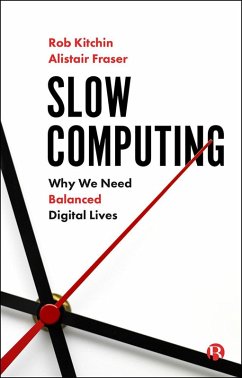Digital technologies should be making life easier. And to a large degree they are, transforming everyday tasks of work, consumption, communication, travel and play. But they are also accelerating and fragmenting our lives affecting our well-being and exposing us to extensive data extraction and profiling that helps determine our life chances. Initially, the COVID-19 pandemic lockdown seemed to create new opportunities for people to practice 'slow computing', but it quickly became clear that it was as difficult, if not more so, than during normal times. Is it then possible to experience the joy and benefits of computing, but to do so in a way that asserts individual and collective autonomy over our time and data? Drawing on the ideas of the 'slow movement', Slow Computing sets out numerous practical and political means to take back control and counter the more pernicious effects of living digital lives.
Dieser Download kann aus rechtlichen Gründen nur mit Rechnungsadresse in A, D ausgeliefert werden.


